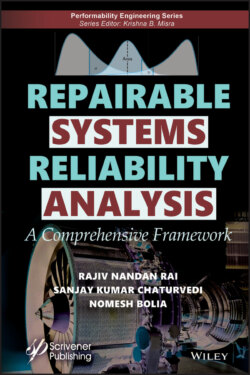Читать книгу Repairable Systems Reliability Analysis - Rajiv Nandan Rai - Страница 13
Оглавление
List of Figures
| Figure 1.1 | Types of repair |
| Figure 1.2 | Various techniques for reliability analysis |
| Figure 2.1 | A MCF example |
| Figure 2.2 | An improving system |
| Figure 2.3 | A stable system |
| Figure 2.4 | A deteriorating system |
| Figure 2.5 | History and distribution of failures observed at age t |
| Figure 2.6 | MCF plot of Example 2.2 |
| Figure 2.7 | Graphical plots of Example 2.3 |
| Figure 2.8 | MCF with confidence bounds of Example 2.2 data |
| Figure 2.9 | MCF plot of Example 2.4 |
| Figure 2.10 | A ROV. (Image taken from: https://www.pinterest.com/pin/552676185495210644/?nic=1) |
| Figure 2.11 | MCF by combining all failure modes |
| Figure 2.12 | Event plot for each system |
| Figure 2.13 | MCF plot of each system |
| Figure 2.14 | Grouping of systems based on performance behavior |
| Figure 2.15 | Event plot of all three groups |
| Figure 2.16 | MCF plot of all three groups |
| Figure 3.1 | Bathtub-shaped intensity function |
| Figure 3.2 | Conditional probability of occurrence of failures |
| Figure 3.3 | Photograph of an aero engine |
| Figure 3.4 | Intensity function plot for Example 3.1 |
| Figure 3.5 | Intensity function plot for Example 3.2 |
| Figure 3.6 | Intensity function plot for Example 3.3 |
| Figure 3.7 | Availability plot for Example 3.3 |
| Figure 5.1 | Reliability-based HFRC threshold |
| Figure 5.2 | Availability-based threshold for HFRC |
| Figure 5.3 | Flying task vs. availability |
| Figure 6.1 | q vs. F(vi | vi–1) for FM1 |
| Figure 6.2 | q vs. F(vi | vi–1) for FM2 |
| Figure 6.3 | q vs. F(vi | vi–1) for FM3 |
| Figure 7.1 | Overview of the approach |
| Figure 7.2 | Evaluation of alternatives through ANP |
| Figure 7.3 | Evaluation of APE through AHP |
| Figure 8.1 | Overview of Chapter 8 |
| Figure 8.2 | Propagation of variability between workstations in series |
| Figure 8.3 | Work flow/work stations for engine overhaul line |
| Figure 8.4 | Work flow/work stations for LPCR blades |
| Figure 8.5 | Work flow/work stations for CCOC |
| Figure 8.6 | Work flow/work stations for LPTR blades repair |
